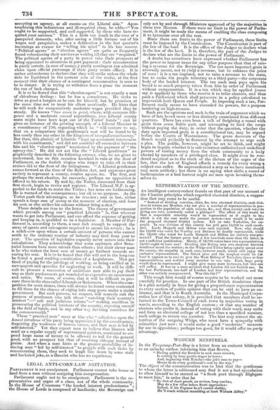REPRESENTATION OF THE MINORITY.
Am intelligent correspondent founds on that part of our account of the Chartist principles which regarded electoral districts, a sugges- tion that may come to be useful.
" Instead of dividing counties, cities, &c. into electoral districts, each divi- sion to return one Member, why not give a number of representatives in pro-
portion to the population of each county, &c., and then restrict each voter to
giving one vote, commonly called a plumper ? The effect of this would be that a respectable minority would be represented as it ought to be;
which is not the case under the present system—nor would it be under the proposed electoral district system. Let us take Yorkshire, for ex- ample. In one division of this county the poll gave 12,000 to each candi- date. Lords Morpeth and Milton were each rejected. Now, why should the 12,000 who voted for Wortley and Denison be doubly represented, while the 12,000 who voted for Lords Morpeth and Milton are entirely unrepre- sented? That the former party had a few hundreds more than the latter, is not a sufficient justification. Surely, if 12,780 voters have two representatives,. 12,080 ought to have one I Dividing this Riding into two electoral districts would not mend the matter ; as the Whigs and Tories being equally spread over the county, the majority in each case, however small, would still enjoy the exclusive representation. The fairest plan and the simplest would be (at least it appears so to me) to give the West Riding of Yorkshire three or four representatives, and restrict every member to one vote. Each large party
would then be represented. I might give many more instances, but this one will suffice. It was by a mere accident that London did not furnish one. In the last Parliament, one-half of London had four representatives, and the other was entirely unrepresented. Was this fair ?"
This rough hint would of course require to be worked out more carefully for practice. In one part of the British dominions there is a plan actually in force for giving a proportionate representation to every section of public opinion that can be said to have an ex- istence, and that is in South Australia. In the Municipal Corpo- ration law of that colony, it is provided that members shall be re- turned to the Town-Council of each town by majorities voting in wards, according to the English custom ; or that any number of electors who prefer it, instead of voting with their ward, may unite and form an electoral college of not less than a specified number, such college to return one member. The hint may attract the at-
tention of the outgoing Whigs, who must have a sympathy with minorities just now : it would make a good "moderate" measure for use in opposition ; perhaps too good, for it would offer no party advantage.


























 Previous page
Previous page